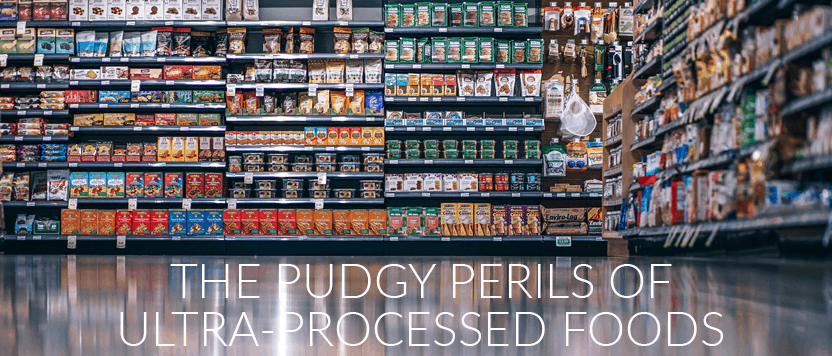You may not have needed the United States government to publish a study to tell you that you will gain weight if you eat a diet loaded with processed convenience foods. You have likely read, heard, or intuited that consuming a whole-food diet has many short and long term health benefits! But even if you are a nutrient-rich whole-food devotee with the rare cheat day, you’ll want to learn the fascinating results of this recently published study in the journal Cell on the short term effects of an ultra-processed food diet on weight gain. If you even partially believe that these foods can be a part of a healthy diet, strap in, because we guarantee you’ll be shocked.
What are Ultra-Processed Foods?
In this study, the research team at the National Institute of Diabetes and Digestive and Kidney Diseases at the National Institutes of Health (NIH) led by scientist Kevin Hall first defined ultra-processed foods as a function of the different types of industrialized processing a food or nutrient goes through before we consume it. These practices, such as the classic example of refining flour, usually degrade valuable micronutrient content. For example, compared to a whole foods breakfast like whole wheat toast, an egg over easy, and some gently sautéed greens, an ultra-processed breakfast could be a refined white flour bagel sandwich with a previously fried and frozen hash brown, a sausage patty, and scrambled eggs made with whites that have been blended, dyed yellow, and pasteurized. Many people grab a meal like this on the go every morning for years of their lives- keep that in mind as we assess the damage of just two weeks of consuming ultra-processed meals.
In the United States, there is a striking correlation between the rise of our industrialized food system, our consumption of an increasing amount of ultra-processed foods, and the skyrocketing incidence of obesity and type 2 diabetes, sometimes referred to as the diabesity trend.[1] Ultra-processed foods are made using large amounts of cheap, refined ingredients such as corn, wheat, and soy, to create an ever-growing array of fast and convenience foods. Why should you care? Because the majority of calories American’s consume are from these foods.[2] Previous studies have reported the correlation between eating ultra-processed foods and the risk of obesity, illness, and death, but this study actually shows a causative effect on our waistlines.
Summarizing the Study
In short, this small but well-designed study showed that just a two week diet on ultra-processed foods resulted in study participants eating an extra 500 calories per day and gaining 2 pounds compared to participants consuming a macronutrient-matched whole food diet. The weight gain can be explained by eating more calories: dietitians are trained that, all things being equal, a eating an extra 500 calories per day results in weight gain of 1 pound per week.
It is hard to look at diets in isolation because our lives are complicated, our choices vary, and many factors can muddy the results of dietary studies, so this tightly controlled trial is particularly interesting. This randomized controlled trial is one such study and involved 20 participants at an average age of 31 years-old who were on average a bit overweight but otherwise healthy. During a month stay at the National Institutes of Health (NIH), they were randomly assigned to one of two groups- one that ate a whole foods (unprocessed) diet or one that ate an ultra-processed diet for two weeks. They then switched diets and were monitored for another two weeks. Importantly, dietitians controlled the experiment by designing diets identical in calories, sugar, carbohydrates, fat, protein, sodium, and total fiber, leaving the nature of the processed foods and micronutrient content as key factors that could differ between them. Researchers noted the diets were not the same in a few key respects: the processed diet contained about 54 times more added sugars, four times less soluble fiber, half the omega-3 fatty acids, and almost twice the saturated fat as the unprocessed diet. Participants could eat as much as they wanted at meals and snacks, up to two times their daily calorie needs. Despite eating significantly different amounts of food, the participants reported no differences in taste between the two diets.
Why this Study Matters to You
Quantity is not Quality. This study carries weight because just two weeks on the ultra-processed diet was directly shown to cause weight gain– and vice versa for the whole foods diet. Consider that if these are the short-term weight effects, long term effects would likely be devastating. Along similar lines, contemporary research suggests that adding or removing foods with fiber and antioxidants that feed a healthy microbiome in your gut can change the nature of digestion in just a matter of days. Can you see how a lifetime of ultra-processed choices is likely to lead to digestive problems, weight gain, and inflammation – a recipe for chronic disease? Let’s briefly discuss three important observations from this study:
- The ultra-processed diet caused increased calorie intake and weight gain, unlike the unprocessed diet. The study participants gained 2 pounds on the ultra-processed diet by overeating sugar and fat, but not protein. Several factors may contribute to this. First of all, those consuming ultra-processed foods ate more quickly– perhaps due to the crave factor of high fat/salt/sugar foods, or perhaps because unprocessed foods tend to take longer to chew and swallow. The faster you eat, the more likely you are to overeat before your brain gets the message from your gut that you are full. Perhaps the participants just felt hungrier: those eating the ultra-processed foods had lower levels of the appetite-suppressant hormone PYY, while those on the unprocessed diet had higher levels; the same was found for ghrelin, a key mealtime hunger hormone. Also, those consuming the ultra-processed diet chose to eat more calories from sugar and fat but not protein, which is significant because eating more sugar raises levels of the hormone insulin, triggering fat storage!
- The ultra-processed diet increased hunger compared to the unprocessed diet. But why were the participants hungrier with access to more calories and the same levels of protein, fat, and fiber, nutrients known for promoting fullness? As noted above, hunger hormones PYY and ghrelin shifted on the ultra-processed diet in ways that would make one more hungry more often. But assuming two people eat at the same speed, why would an ultra-processed diet with the same amount of calories not tell the brain to stop eating in the same way as an unprocessed diet? Ultra-processed foods might not flip the off-switch on hunger because they don’t provide enough essential micronutrients per calorie. if you are low in magnesium, you may crave magnesium rich foods- choose a baked white flour pastry devoid of magnesium and you will still be hungry. Furthermore, deficiencies in certain micronutrients like calcium or magnesium can drive cravings for foods high in fat, sugar, and salt in a cycle of overeating. Storage even matters: many of these ultra-processed foods and their plastic containers contain compounds known as obesogens– hormone-like compounds and toxins that can drive weight gain, mainly by acting like alien estrogens in your body.
- The ultra-processed diet lacks important essential micronutrients compared to the unprocessed diet. The study clearly shows that matching foods for most of their macronutrient and energy content does not tell the whole story of what foods provide. We use science to support this concept in our book Rich Food, Poor Food and take it further in Naked Calories– that some foods are rich in micronutrients and other important compounds that nourish our health, while other foods aren’t. Eater and buyer beware- many processed and ultra-processed foods are also loaded with micronutrient-depleting and toxic ingredients. Rich foods nourish our vitality and poor foods lay the foundation for obesity and disease.
Furthermore, the study showed that the unprocessed diet, by its nature, was lower in refined sugars and higher in soluble fiber, factors that have been shown to nourish commensal bacteria in a healthy microbiome. As we have written about elsewhere, soluble fiber can be fermented by certain strains of good gut bacteria, such as Ruminococcus[3] or Roseburia,[4] into butyrate, a fuel for colonic cells that helps to reduce local inflammation, supports healthy blood sugar control, and as a result supports a healthy weight. Moreover, added sugar won’t just raise your insulin and risk of weight gain- it can also create a cycle of craving as a potent micronutrient depleter! Twice the omega-3 content in the unprocessed diet would certainly help to reduce inflammation and support a healthy weight! Given these known factors alone are weight-gaining deal-breakers for the ultra-processed diet, we certainly hope future studies like this one will dig deeper and test the micronutrient content of the different diets!
Food Processing for Thought
Not all Processed Foods are Equal. This study focused on ultra-processed foods, but that is not all processed foods. While not all processed foods are bad, we invite you to be skeptical, smart, and savvy when you shop. This study applies to ultra-processed foods, but some gently processed foods may be free of dangerous additives and have value. Safe options could include a blended mustard, an organic miso paste, or a triple threat shake– options in which the processing has increased the food’s nutritional value. Even beneficial processed foods exist on a spectrum. Consider protein powder. We advocate for concentrated, organic protein powders such as our IN.POWER Whey Protein, and our IN.POWER Plant Protein and suggest you steer clear of protein “isolates” that have been stripped of health promoting compounds. Witnessing an epidemic of problems associated with low protein intake such as anxiety, fatigue, osteoporosis, and unstable blood sugar, consistent and adequate protein intake is essential, and a delicious and convenient protein powder may make the difference in our busy lives.
Not all Whole Foods are Equal. Worries about getting enough micronutrients still matter when you are eating a diet rich in unprocessed foods, even macronutrients like protein. While choosing whole or minimally processed foods free of unnatural additives is a great start, true micronutrient sufficiency has roots deeper than that. For instance, we recently wrote about the destruction of farming fields nourished by a healthy underground ecosystem, the depletion of micronutrients in our soil, and what that means for the essential mineral content of our foods. Certain whole foods contain anti-nutrients, such as oxalates and phytates, that bind micronutrients and hinder their absorption- so yes, you may get more nutrition out of cooked green chard than raw green spinach. But before you split that hair with us, ditch the ultra-processed foods.
Gaining a pound per week versus losing a pound per week- that is a huge difference in the first small steps down a dietary path. Even we, who expected such a result, were surprised to see it laid out that clearly. We feel the conclusion is clear- ultra-processed foods simply cannot be any significant part of a healthy, balanced diet. The impact is too great. So as you make careful choices during your next grocery shopping trip, remember- at the end of the day, putting naked calories in your body will never actually nourish you.
[1] https://www.ncbi.nlm.nih.gov/books/NBK279051
[2] https://www.ncbi.nlm.nih.gov/pubmed/26962035











